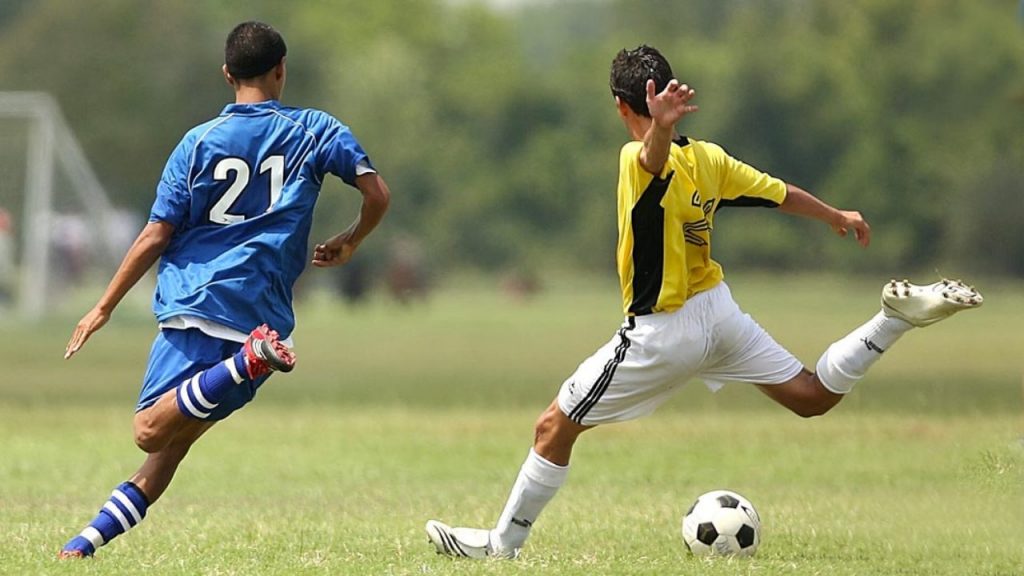
A lot of people around the world love football because it’s a tough game. This team sport is one of the most popular in the world. You need to be skilled, quick, and able to work with others. Football is good for your mind and body in many ways. The game itself gives you a rush of energy, and playing with your friends brings you closer. This piece will talk about the health benefits of football, how it makes you stronger physically and mentally, and why football is still a popular sport for people of all ages and skill levels. People of all walks of life can enjoy football. It brings people together, shows off strength, and looks great.
The Benefits of Playing Football
Being a football player has many benefits for your mental and physical health. Because players have to use their muscles in different ways, like running, kicking, and fighting, the sport is good for their health. This helps you get stronger, more agile, and more physically fit overall.
Football is also good for your heart because it’s a great way to work out your heart and lungs. The constant running and racing in the game raises your physical ability, makes your heart stronger, and lowers your blood pressure. Football is also good for your bones because it makes them stronger. This raises bone mass and lowers the risk of osteoporosis.
When it comes to mental health, football is a game that needs attention, focus, and planning ahead. This helps the brain work better and makes the mind stronger. Playing football is also a good way to relieve stress and improve mental health by lowering worry and sadness.
Football is also a very social sport because players can talk to both their friends and their opponents, which builds teamwork and strong relationships. This practice is fun and interesting, and it helps with endurance, agility, and balance. Football brings people together, whether they play professionally or just for fun. It’s good for your body and mind, and it can help you live a better, happy life.

Benefits of Engaging in Football
There are many mental and physical health perks to playing football. People who play football get a lot of health benefits, from better heart health and stronger bones to better brain function and better mental health. Football is good for your health and fitness in many ways, whether it’s because it makes you work hard physically, make you think strategically, or help you deal with your feelings. This piece will talk about the many health benefits of football and why people of all ages and skill levels should think about taking up the sport.
Cardiovascular Health
Heart health is important in football because you’re constantly moving during the game, which is great for your heart. Playing this sport regularly can help your heart stay strong, lower your blood pressure, clean out your coronary vessels, and burn extra calories.
Football players are always moving, running, walking, and racing for long amounts of time. This steady exercise keeps the heart pushed and stronger, which makes it work better overall. Because of this, the chance of getting heart diseases like heart attacks and strokes may go down.
In addition, the tough physical demands of football help keep plaque from building up in the heart arteries. Because the sport is so hard, it improves blood flow and oxygenation, which keeps cholesterol from building up in the arteries. This helps keep coronary vessels healthy and lowers the risk of problems with the heart.
Football is also a high-intensity physical activity that can help lower blood pressure. Moving around and working out all the time can lower your blood pressure at rest, which is good for your heart health.
Also, the strong physical exercise of football helps burn extra calories, which can help you control your weight and lower your risk of health problems related to fat. The mix of cardio and strength training makes you fitter overall, which is why football is a great way to stay in shape.
Bone Strength and Injury Risk Reduction
Football is great for your heart health, but it’s also very important for building bone strength and lowering the risk of getting hurt. There are a lot of repeated weight-bearing loads during a football game. These loads improve the bones by increasing their stiffness and mass.
Activities like running, jumping, and tackling put stress and pressure on bones, which helps bones grow and change. This helps keep bones healthy and lowers the chance of breaking them. Physical activity like playing football regularly changes the way bones are built, which makes bones stronger and denser.
Strength training is often done along with football, which is another good thing for bone and joint health. Strength training movements like squats, lunges, and plyometrics put more stress on bones, which helps them grow and lowers their risk of getting osteoporosis. Also, football players often eat a lot of protein to help their muscles grow, which is good for their bones in a roundabout way.
People who play football can get the benefits of weight-bearing exercise, which makes bones stronger and lowers the risk of osteoporosis and broken bones. One of a kind chance to improve bone density and mass while enjoying the thrill of the game is to play this physically challenging sport.
Physical Strength and Endurance
Football is a game where strength and agility are very important. For this very physically demanding sport, a player needs to be strong in both their upper and lower bodies. Not only does playing football regularly help you get stronger overall, it also gives you a way to improve your fitness.
During football practice, players do a range of power training drills to improve these skills. Doing callisthenics moves like push-ups and pull-ups can help you get stronger in your upper body. Resistance training with weights and other routines work on specific muscle groups, which helps build strength and power. Plyometric movements make you faster and more agile. Agility drills help you be quick and change directions, and runs make you faster and stronger in the heart and lungs. Regular stretching keeps you flexible and lowers your risk of getting hurt.
Football is also good for your bones and muscles because it makes you work out a lot. In football, you have to keep running, hitting, and jumping, which works your muscles all the time and helps them get stronger and more toned. These activities put stress and pressure on bones, which causes bones to grow and change shape. This makes bones stronger and denser.
Hand-Eye Coordination Improvement
Because football involves a lot of complicated moves, it can really help your hand-eye balance. For skills like shooting, moving, and throwing, the hands and eyes need to work together perfectly.
When you dribble the ball, you have to move it around with both feet and keep an eye on your partners and opponents. This takes quick responses and precise control, which makes your hand-eye balance better. In the same way, you need great balance to quickly change directions while still controlling the ball.
Another important thing that hand-eye coordination helps with is passing the ball correctly and successfully. When you receive a pass, you have to keep your eyes on the goal or the person you’re supposed to pass the ball to while figuring out the ball’s speed and path. You also need to be very aware of your surroundings and have perfect timing to kick the ball. You have to hit it with your foot at just the right time.
Hand-eye balance is important for football because it helps both individual skills and the team’s general success. It’s possible for precise plays and shots to make a big difference in a game. Players can get an edge over their opponents if they can quickly decide what to do based on what they see.
Improved Mental Toughness and Resilience
Football not only makes you stronger and more coordinated, but it also makes you mentally tough and resilient. During games, football players always have to deal with problems, losses, and mistakes. This helps them learn how to deal with problems and get back on their feet after things go wrong.
Kids learn important life skills like mental toughness, drive, and sticking with something even when it gets hard. They are taught to keep going even when things get tough or when their team is behind. It’s important to be able to stay focused and keep a good attitude both on and off the pitch.
Playing football is good for your mental health in many ways, not just making you stronger mentally. The “feel-good” hormones, endorphins, are released when you work out, like when you play football. This lowers stress, boosts happiness, and makes mental health better in general.
Being on a football team is also good for your mental health because it gives you a support system and makes you feel like you fit. The friendship and social contact with teammates create a support system that helps people stay mentally and emotionally healthy.
Reduced Levels of Body Fat
Playing football can help you lose body fat in addition to being good for your mental health and social life. A lot of energy has to be used to do the physical parts of the sport, like running, kicking, and changing directions. What this means is that players burn a lot of calories every time they play or practise.
Based on the player’s weight and how hard they play, a 30-minute game of football can burn up to 600 calories. Over time, this ability to burn calories can help people lose body fat and keep a better weight, which can improve their body makeup.
However, it’s important to remember that good diet is also needed to lose body fat. A healthy diet with lots of fruits, veggies, lean meats, and whole grains should be important for football players. Making sure you get enough protein is especially important because it helps build and repair muscles. Players can help their muscles grow, speed up healing, and keep their body fat percentage low by eating enough protein.
Increased Muscle Mass and Strength Training Opportunities
In addition to improving your physical health and teaching you how to work as a team, football can help you build muscle and do strength training.
Kicking, jumping, hitting, and protecting the ball are all physical demands of football that help build upper and lower body power. These moves work out many muscle groups, like the arms, legs, and core. This makes you stronger and builds muscle growth.
Strength training routines are also often a part of normal football practice. Doing callisthenics exercises like push-ups, squats, and lunges can help you get stronger and last longer. Power and muscle strength are increased even more by plyometric drills, which include quick actions like jumping and running.
Besides these workouts, football also has speed drills that test your balance, timing, and quickness, which help you build useful strength. Some of these drills are ladder drills, cone drills, and shuttle runs. They are all meant to help you get faster and stronger on the field.
By doing these strength training activities during football practice, players can build more muscle, improve their physical ability, and lower their risk of getting hurt. So put on your cleats and get ready for the physical challenges of football. It’s a fun and different way to improve your strength, power, and general fitness.
Emotional Health Benefits of Football Participation
There are many health perks to playing football, and it also helps protect your mental health. Playing this famous team sport can help you become more mentally tough and emotionally strong. The competitive nature of the game teaches players how to handle stress, bounce back from losses, and keep going even when things get hard. You’ll be able to handle high-stress events on and off the pitch better because of this. Being on a football team also helps people feel like they fit and builds community, offering support and friendship. Football can be good for a player’s mental health because it promotes teamwork, shared experiences, and a sense of community. It can boost self-esteem and lower feelings of loneliness or separation. Another thing that adds to a sense of purpose and fulfilment is the love and devotion for the sport. In conclusion, football is a great sport for both physical and mental health because it improves both the body and the mind.

Improved Self-Esteem and Self-Confidence
Self-esteem and confidence can go up a lot when you play football. Being physically stronger and more durable through football can boost your confidence on and off the pitch. Players start to push their limits and see what their physical potential is as they train and get stronger. This achievement gives them a sense of power and confidence in their skills.
Playing as a team can also help your self-esteem because you get to connect with other people. Players feel like they belong and have accomplished things when they work together to reach a shared goal and enjoy wins. Self-esteem can go up even more when you win games and get praise from your friends and teachers. The team’s support and praise make the setting upbeat, which helps players believe in their own skills.
Having higher self-esteem and confidence can help you in many areas of your life. When players are sure of themselves, they are more likely to do their best in school, at work, or in their personal relationships. They are driven to take chances, deal with problems, and get past problems. Having higher self-esteem can also improve your emotional health, make you more optimistic, and make you stronger when bad things happen.
Stress Relief from the Passion for the Game
Because football fans are so passionate about the game, it can help them deal with stress. Football can be a way to escape the stresses of everyday life and give you a much-needed break. Football can take people to a world of fun and excitement, whether they’re cheering for their favourite team, playing with friends in a local league, or watching a game on TV.
People can relax and unwind by playing football because it’s exciting and gives you a rush of energy. Endorphins are the “feel-good” hormones that are released when you do a lot of physical exercise. They can help relieve stress and improve your mood. The need to concentrate and focus on the game can also help players forget about their everyday problems and fears, letting them be fully in the present moment.
Also, the friendship and social contact that football promotes can give you a feeling of support and connection, which can help relieve stress even more. Being on a team and sharing your love of the game with other players can give you a strong sense of connection and friendship, which can be very helpful.
Conclusion
As a conclusion, football is more than just a game; it’s a great way to help kids get fit and grow as a person. It does more than just improve circulatory health and physical strength; it also boosts self-esteem and confidence.







